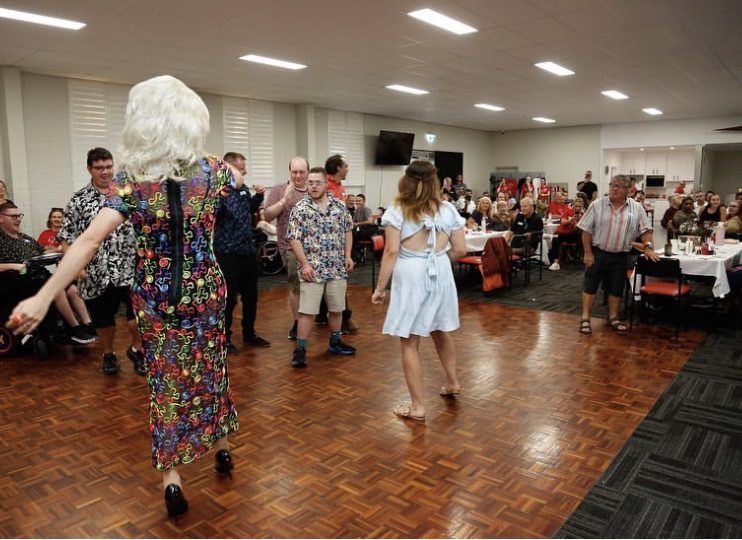Finding love and friendship for people with disabilities is the focus of a Warilla business that has so far created 150 potential love matches, 10 couples dating, and countless social connections over just four events.
According to the Australian Institute of Health and Welfare, four in nine people who have a disability avoid social situations.
Dating with a Disability, which is held at the Warilla Surf Club, is open to all disability service providers and, so far, has attracted huge crowds with at least 80 people searching for love on each night.
The date nights are the brainchild of Rock N Rollers promotions manager Pat Peardon, who decided it was time to help people with disabilities overcome their fears and anxiety in social settings, easing the path to love and happiness.
“Once I got to know my clients I’m working with, I find out that their number one problem is the inability or lack of chances to find love and connection,” Mr Peardon said.
“This is often due to the group homes they are living in or the situation with their parents being a bit over the top, or they have tried online dating and where there is a lot of scamming and hacking because they are very vulnerable people.
“So, I thought, why don’t we create a safe space where you can come and mingle and potentially find love? Therefore, birthed the idea of Dating with a Disability.”
Disability Discrimination by UOWTV
Dating with a Disability is designed to be less overwhelming, with Mr Peardon hosting the event to help ease the social pressures.
“We break clients up into separate tables, randomising the order so they are seated with new people,” Mr Peardon said.
“The more you talk early, the better it is later. If you get talking sooner, your anxiety goes out the window and you stop feeling so overwhelmed and begin to climatise to the environment.
“I really feel like we’ve found a model that really does make it easier and less overwhelming for everyone there.”
Dating with a Disability activities by UOWTV
People with a disability face a range of barriers that can sometimes make it difficult to socialise, creating a greater risk of isolation and loneliness than those without a disability.
A 2022 study involving 2208 young adults living in Australia and Hong Kong shows that many view people with a disability as asexual, de-gendered, incapable of sexual relationships, and lacking the capacity to have successful long-term intimate relationships.
The research suggests that for people without a disability, dating someone with a disability is often seen as too much work, socially awkward and unlikely to be sexually satisfying.
Mr Peardon said that despite the negative statistics, it’s through disability support work that he hopes to break the stigma and help people with disabilities live the life they are entitled to.
“I feel like services like this really do help to get people out of the house and make a difference in life,” Mr Peardon said.
“I feel like it’s a necessity in life cause just like you and I they deserve to live, and they deserve the right to find love and that’s what we’re here to do.”
Source: Attitudes Toward Dating People with Disability Amongst Young People in Australia and Hong Kong
Rock N Rollers, the company responsible for the Dating with a Disability nights, is a support program facilitating the experiences of a lifetime for people with a disability.
The Rock N Rollers support groups offer people with a disability to be a part of a social group, taking their clients out so they can find new friends at places like live music gigs, events, and other situations that other support organisation might class as too difficult.
Founder Kylie Jones said the idea for Rock N Rollers began early in her disability support career when she noticed a considerable lack of opportunity for clients to feel like part of a social group with similar interests, ages, and abilities.
“Today, there are so many great support services available, however, most of these still have their restrictions,” Mrs Jones said.
“More than ever, our clients are seeking the chance to connect with others of similar age, interests, and level of disability.
“Everyone deserves to meet their tribe, be amongst them and see those they admire and love performing.”
With one in six Australians living with a disability, Rock N Rollers has continued to grow and workers within the industry are hopeful other service providers will begin to implement a similar business model.
If you are interested in being a part of Rock N Rollers or want to keep up to date on Dating with a Disability night, follow the organisation on Instagram or head to www.rocknrollers.com.au.

